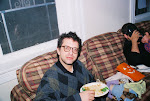Way before Nicholson Baker it was not cool to talk against Wikipedia as a researching scholar.
So I'll do it.
How often do I encounter the student gaze that says: Why is your particular selection of material, stories, illustrations, and texts, being given to me instead of the story I find elsewhere, like on Wikipedia?
The God of Democratic Knowledge!
Because we dabble in knowledge according to a more ancient formula than popular acclaim. Alright, a medieval formula.
If you look up Harar, on Wikipedia, you learn about an ancient crossroads town in Ethiopia still with its city wall or "jubal," and you learn that they throw meat to the hyenas outside the city walls for sport.
All in all I like the entry. I don't know whether it is really all so, but I suspect it is.
You look up Ndebele, on the other hand . . .
There is a serious problem here. It's asinine. Way behind the basic research that's gone on for two decades, etc. So is the answer a GoogleBooks search?
All Hail Google!
From the students, the question is, If your story is better than the common story, Dr Whoever you are, why hasn't it been distilled and made available to me already in one set of copy-able texts or texts and images (aka "the internet"), -- -- why, in short, is what you are selling not already popular enough to be bought wholesale and be published and accessible at the touch of a button?
As part of "the knowledge out there," the objective facts about so many things that just "are"?Because isn't that the way things work? No? Does that mean you are an elitist?
Dr. Landau, isn't what everyone thinks happened more important than what you think happened?
Dr. Landau, isn't what everyone else thinks happened what I should be learning, because that's what the rest of the world is going to "test" me on? -- and what do you mean by speaking about subversive knowledge?
Really the virtual reality of consensus information is extremely vulnerable to being "twisted" or "bent," as Roland Barthes said about complex packages of already-known symbols which "depoliticize" the world.
Oh, did I say Wikipedia? Their short and clear analysis of Barthes's book somehow misses this point.
The Democracy of Right! Ionesco, come back.
"The real story" is . . .
How far ahead of the curve can a University history lecture course on Africa take us, for understanding the history of the continent in some meaningful way? -- That a website or a website "slide and lecture" web course can't do better? In a world of immediate "information" without provenance, without speakers, without implications for speech, without any requirement to read to the end of the page?
We are based on text. Wikipedia is a post-print age concept: a palimpsest of a 360 degree bubble lens wrapping the earth in words. It is not a text.
So there it is now. Robert Darnton, they bought you out with that library. I'm selling harder than ever, and I still refer to our "library," but I hear the roar getting louder, the police boats are catching up.
Pit stop number one: Publish book.
Pit stop number two: Stop caring.

No comments:
Post a Comment